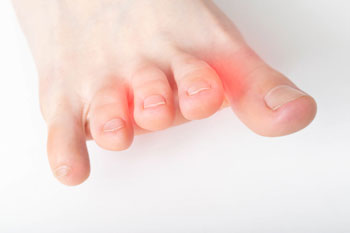
Neuroma Treatments in Plano, Dallas, Prosper & Allen, TX
A neuroma is a benign nerve tumor usually found between the third and fourth toes. Neuroma is a painful foot condition that may, in some cases, cause numbness in the entire foot. The main symptom of neuroma is recurring pain. That’s why people with this condition usually don’t engage in strenuous activities. Some also find relief by removing their shoes. Applying pain reliever ointments may help alleviate the pain. Doctors cannot pinpoint the exact cause of neuroma. However, some possible causes include:
Trauma: According to foot doctors, one possible cause of this condition is trauma. People that have experienced traumas to their feet are prone to developing neuromas. Trauma results in inflammation of the affected foot. Eventually, the inflammation becomes a tumor.
Biomechanical deformities: People with flat feet or high arches are more prone to developing neuroma. These people have instability when standing, leading to continuous stress on the foot. The pressure can cause development of a nerve tumor.
Improper footwear: Another cause of neuroma is wearing tight shoes. We also discourage high-heeled shoes because they increase pressure on the heels.
Workplace activities: If your work requires prolonged standing, you are more likely to develop neuroma. Experts advise wearing shoes with soft inside padding to minimize the risk of neuroma in the workplace.
Neuroma symptoms
Here are some of the most common symptoms of a neuroma:
- Recurring pain in forefoot and toes
- Pain in your foot when bearing weight
- Numbness in your foot
- Swelling and redness between toes
Neuroma treatments
When neuroma is still in the early stage, you can manage its symptoms at home. Here are some home neuroma treatments you can use to manage the discomfort caused by neuroma:
Wear loose shoes: One of the best neuroma treatments is to wear loose shoes. Shoes with wide toe boxes will keep your toes relaxed. This will result in the reduction of swelling. Also, when you wear comfortable shoes, your pain will subside because the nerves of the toes are no longer being constrained.
Frequent foot massage: It will help if you regularly massage the affected foot. Constantly massaging the foot will help relax muscle tissues and promote good blood flow. As a result, the pain caused by neuroma will gradually fade away.
Use orthotics or shoe pads: You can also buy over-the-counter shoe pads to protect your toes. Wearing shoe pads helps relieve stress on the foot.
Use ice packs to relax your foot: Another way to relax the affected toe is by using ice packs. Ice is very effective in managing the pain of neuroma.
Wear shock-absorbing shoes: Find shoes that have shock-absorbent soles. This will keep your foot relaxed. Also, shock-absorbent shoes help reduce the impact of stress or pressure on your toes.
These are just some of the home remedies you can use to manage neuroma pain. While these measures can help alleviate pain, permanent cure is not guaranteed. For more permanent neuroma treatments, visit your trusted podiatrist.
Does neuroma go away on its own?
Unfortunately, neuroma doesn’t go away by itself. You need some neuroma treatments to alleviate the condition. At some point pain may stop, but it will eventually reoccur. Most of the home neuroma treatments are only capable of managing pain and swelling of the foot.
How do you treat Morton’s neuroma without surgery?
There are several ways to manage the symptoms of Morton’s neuroma. If your case is mild, you don’t need to undergo surgery. You can try the home remedies mentioned above. Fortunately, home remedies that manage the pain and swelling of Morton’s neuroma are very simple. You can try the following:
- Ice Massage
- Wear well-fitting shoes
- Rest and relax
- Take OTC anti-inflammatory drugs
What does neuroma feel like?
When you have a neuroma, your second, third, and fourth toes will feel pain. After the recurring pain, you may feel numbness on your foot. Tingling sensations will start from the ball of the foot towards the end of the toes. Most cases of neuroma also cause ‘hot pebble’ sensation between your toes. Once you notice something wrong in the base of your foot, immediately check it out. Consult a foot doctor to see if you have neuroma. Early detection helps us treat neuroma without invasive surgery.
What happens if Morton’s neuroma goes untreated?
Morton’s neuroma is different from the typical neuroma. Morton’s neuroma is actually not a tumor, but rather a thickening of the tissue that affects nerves in your toes. If not treated, Morton’s neuroma will develop complications such as permanent nerve damage. People with this condition cannot engage in physical activities and sports. Eventually, untreated Morton’s neuroma will make you bedridden as it hinders the ability of your foot and toes to bear weight. Standing may become impossible. To prevent these complications, you need to act promptly.
Once you notice lumps forming around the ball of your foot, immediately consult a foot doctor.
Graff Foot Ankle Care is the most trusted neuroma treatment clinic in Texas. We have highly skilled podiatrists who can help you with effective, high-quality treatments. We use leading-edge technology and medical procedures to provide you the best neuroma treatments and after-care support. Contact us today to for the best neuroma treatments in Plano, Dallas, Prosper & Allen, TX.
Are you suffering from neuroma? Schedule an appointment with Graff Foot Ankle and Wound Care. Call (972) 403-7733 today or use our convenient Request an Appointment form to schedule your visit.
